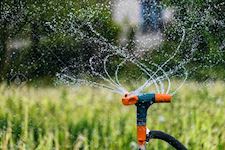Irrigation (Gardens) - Endorsed Certificate Course (TQUK - Training Qualifications UK)
Distance learning based course with study materials, tutor support and final exam included
Academy For Distance Learning
Summary
- Exam(s) / assessment(s) is included in price
- Tutor is available to students
Add to basket or enquire
Overview
Irrigation (Gardens) Online Course.100 Hours Endorsed Certificate Course (TQUK - Training Qualifications UK).
Crop Irrigation course online. Learn how to install and maintain an irrigation system easily through distance learning studied from home!
This is a ten lesson course that covers the design, installation, maintenance, operation and evaluation of simple irrigation systems. This course focuses on irrigation for parks, home gardens, and other ornamental horticulture areas.
If you need to have extensive skills in garden irrigation techniques, rather than just a basic working knowledge of how garden irrigation works, then this course is for you. Become a Garden Irrigation Specialist and advise, design and install effective and personalised irrigation systems, to enable plants to grow and flourish in gardens, parks and other horticultural settings.
Learn from irrigation experts who have developed this certificated course over many years, with the help of a tutor/mentor, who will be there to help you every step of the way.
Benefits of an ADL Endorsed Course?
Endorsed courses are skills based. They have been evaluated and approved by an independent awarding body such as Training Qualifications UK (TQUK).
What makes ADL’s Endorsed courses different?
- Flexible Self-Paced Learning– adjust your learning around your home and work commitments
- Start and Finish at any time
- Courses globally and industry relevant
- Practical Component at the end of most lessons.
Allocated your own tutor relevant to your subject. You can have as little or as much contact as you like with your tutor. They are there to support you all the way through.
This course is endorsed by TQUK -Training Qualifications UK, an OFQUAL awarding body.
Achievement
Course media
Description
Lesson Structure: Irrigation (Gardens) BHT210
There are 10 lessons:
1 Introduction to Irrigation
- Introduction
- Objective of Irrigation
- Irrigation: The Wider View
- Sources of Water
- Feasibility of Irrigation
- How to Improve the Quality of Water From Any Source
- Likely Quality Problems in Different Kinds of Water
- Problems of Water Quality and There Remedies:
- Physical Impurities
- Chemical Impurities
- Biological Impurities
- Bacterial Impurities
2 Soil Characteristics and Problems
- Understanding Soils
- Naming the Soil
- Different Soils Suited to Different Purposes
- Improving Soils
- Chemical Properties of Soil: Soil pH (acidity/alkalinity), Sodicity, Salinity
- Physical Properties of Soil: Soil Uniformity, Available soil water capacity, Infiltration, Internal Drainage
- Soil and Water
- Kinds of Soil Moisture: Gravitational Water, Capillary Water, Hygroscopic Water
- Transpiration and Wilting Point
- A Feel-Test For Esimating Soil Moisture Level
- Fertigation
- Different Types of Fertigation Equipment
3 Estimating Plant Needs and Irrigation Scheduling
- When to Irrigate
- Signs to Look For: Symptoms of Water Deficiency, Symptoms of Water Excess
- Checklist For Home Gardeners
- Timing of Irrigations
- Measuring Water Available to Plants: Calculating Field Capacity, Calculating Permanent Wilting Point, Available Moisture Range
- Rooting Depths of Selected Plants
- Water extraction by roots
- Irrigation Calculations
- Estimating Water Needs
- Estimated Water Loss From Soil Under Different Climatic Conditions
- Tensionmeters
- Water Requirements of Turf Grasses
- Imporatance of Schedules
- Scheduling Irrigation
- Water Volumes and Duration
4 Drainage
- Introduction
- Drainage
- Improving Permeability During Constuction: Cultivation, Adding Soil Ameliorants, Chemical Treatments
- Improving Surface Drainage After Construction
- Layout of Drains
- Outlet
- Gradients
- Distance between the Drainage Pipes
- Depth of Drains
- Laying the Drain
- Dams and Water Storage
- Soil Degradation
- Erosion: Water, Wind, Control
- Soil Acidification including Causes
- Soil Compaction
- Chemical Residues
- Waste Water Treatment Using Reed Beds
- Suitable Plants
5 Types of Irrigation Systems
- Introduction
- Flood Irrigation Systems
- Pressurised Irrigation systems
- Conventional Sprinkler Systems: Portable, Permanent, Semi-Permanent
- Mechanised Sprinkler Irrigation Systems
- Fixed Sprinkler Systems
- Quick-Coupling Systems
- Sprinkler Heads
- Mechanisms That Drive Rotating Head Sprinklers
- Design Considerations
6 Trickle Systems
- Trickle Irrigation
- Do It Yourself Micro Irrigation Systems
- Time Length of Watering
- Automatic Systems
- Maintenance of Watering Systems
- Micro-jet Irrigation
- Maintaining Your Trickle Irrigation
7 Design Specifications
- Hydaulics
- Calculating Discharge or Flow
- Velocity
- Friction Loss in Systems
- Water Hammer
8 Pumps and Filters
- Types of Pumps
- Pumps and Pressure Systems
- More on Types of Pumps
- What to do if a Centrifugal Pump Fails to Operate
- Trickle Irrigation: Prevention of Clogging
- Controllers
- Technical Data Sheet – Mechanical Tap Timer
9 Selecting the Right System for a Plant
- Water Saving Measures
- Filtration
- Flood Irrigation
- Sprinkler Irrigation
- Trickle Irrigation
- Example – Putting Greens
- Example Trickle Irrigation in Ornamental Gardens
- Example – Irrigation of Vines
- Set Reading
10 Design and Operation of Systems
- Introduction: Cyclic Watering, Pulse Watering
- Scheduling Irrigation
- Sprinkler Spacings
- Designing and Considering Sprinkler Performance
- Electrical Factors
- Electric Automatic Systems
- Design Considerations
- Set Reading
Please note: Each lesson is followed by a self-assessment test, set task or tasks which could include: further research, networking, plus looking at the advantages and disadvantages of a particular subject and finally written assignments. The final written assignment is marked and graded by your personally assigned mentor and sent back with helpful comments and suggestions.
Who is this course for?
Gardeners, Garden Designers, Horticulturalists, Farming Enthusiasts, Agriculturists
Requirements
A pc or laptop with internet connection.
Career path
Irrigation specialists are professionals responsible for the installation and servicing of irrigation systems. There are no formal educational requirements to becoming irrigation specialists as most professionals began their careers with an entry-level position at a grounds keeping company or a professional gardening outfit. These experts understand how to arrange various types of water systems.
Questions and answers
Currently there are no Q&As for this course. Be the first to ask a question.
Reviews
Currently there are no reviews for this course. Be the first to leave a review.
Legal information
This course is advertised on reed.co.uk by the Course Provider, whose terms and conditions apply. Purchases are made directly from the Course Provider, and as such, content and materials are supplied by the Course Provider directly. Reed is acting as agent and not reseller in relation to this course. Reed's only responsibility is to facilitate your payment for the course. It is your responsibility to review and agree to the Course Provider's terms and conditions and satisfy yourself as to the suitability of the course you intend to purchase. Reed will not have any responsibility for the content of the course and/or associated materials.





